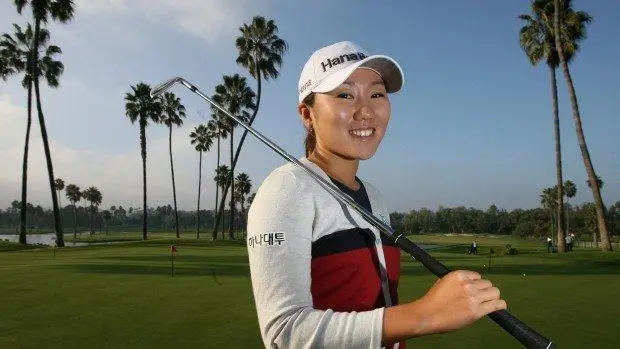Faced with a massive influx of young, foreign-born players onits circuit three years ago, the LPGA Tour considered the idea of penalizing players whose English-language skills were not up to par.
Although the tour’s objective was to make its product more attractive to sponsors and fans by making its players easier to know and understand —- when they were conducting interviews, playing in pro-ams or accepting trophies —- the policy’s punitive nature became the focus.
Martin George remembered seeing news of the LPGA’s proposed policy on the ESPN news scroll as he worked out at the gym. George wasn’t caught up in the political implications. No, the president of the Language Training Center, sensed a business opportunity.
George never got a chance to answer those specific questions. A few weeks after details of the policy were first reported, the LPGA pulled a U-turn, announcing it would take some time to review, and revise, its proposal.
“I think they were looking for answers and, you know, it probably took some time to figure out what the answers were,” George said.
The policy went away, but many of the issues remained. And the Language Training Center, which entered in a partnership with the LPGA Tour last year, is addressing those issues.
“The tour’s grown globally so quickly,” said Heather Daly-Donofrio, the LPGA director of tournament operations and player services. “Particularly over the last five or six years. We are the most global professional tour in the world. No other tour is as diverse.
“For the business future of the LPGA, as we grow and develop globally, it’s going to be important to be able to go into another country, understand the culture and know the language, to interact more completely.”
The Language Training Center, which is based in Indianapolis, not only provides educational services for players who want to learn English, but for those who want to learn Japanese and Korean.
It also provides instruction in the societal customs and proper manners of various societies.
“They put together these cultural pamphlets for every tournament we go to outside of the United States,” said Daly-Donofrio.
The pamphlets go over everything from how to shake hands to how to exchange money.
Players appear to be embracing the movement.
Daly-Donofrio pointed to American-born Morgan Pressel, who thought it was important to learn some conversational Japanese so she could better interact with fans when she plays there. George said the “poster girl” for the acculturation movement is Spain’s Beatriz Recari.
“She wanted to be appropriate and talk to sponsors, pro-am playing partners, fans, and she worked tirelessly all last year on Japanese,” George said. “She said her time in Japan changed her life. She said she connected with people, and obviously she’s not fluent after six months or seven months of training, but she could fit in. And she could be nice and appropriate and friendly … and she loved it.”
South Korean-born I.K. Kim, who lives in Rancho Santa Fe, is another pupil of the Language Training Center, which conducts training and education at the various tournament sites. Kim, 23, has won three times on tour and this year has five top-10s in eight tournaments.
“I live in the U.S. and I’ve been trying hard to study English,” Kim said. “But since I turned pro and am traveling all the time, I didn’t get to study as much as I wanted.
“It’s such a great idea that they’re coming to (tour) events.And also I can do it on Skype (or) online. But also I’ve been trying to improve my vocabulary and also grammar. I think, especially for me, I need to continue to study.”
Hee Kyung Seo, 24, made a big splash locally when she won the Kia Classic at La Costa Resort and Spa in March 2010. Last winter, she lived in Temecula for six weeks as she took part in a winter training camp at The Golf Course of Rancho California (formerly The SCGA Club).
She said she studied English for six or seven years, starting in the first grade.
“But I don’t know much vocabulary,” she said, “because I study (at) that age, I know just about that age vocabulary.”
Seo wants to feel more comfortable with her pro-am partners.
“I’m really sorry for them, because I’m not really good at English,” she said.
“I want to say lots of things, but I don’t know how to explain them.”
Although she had not signed up for any LTC classes when she was interviewed at the Kia Classic this spring, Seo said she fully intended to.
“I need to keep learning,” she said.
The hottest player on tour right now is Yani Tseng, 22, who won last week’s Wegmans LPGA Championship by 10 strokes, and has claimed three of the last six majors. Daly-Donofrio said that last year Tseng received the Rolex Player of the Year award on Sunday night, and at 8 a.m. the next day she was attending an English class.
Said Daly Donofrio: “It’s chic now on tour to learn another language.”


